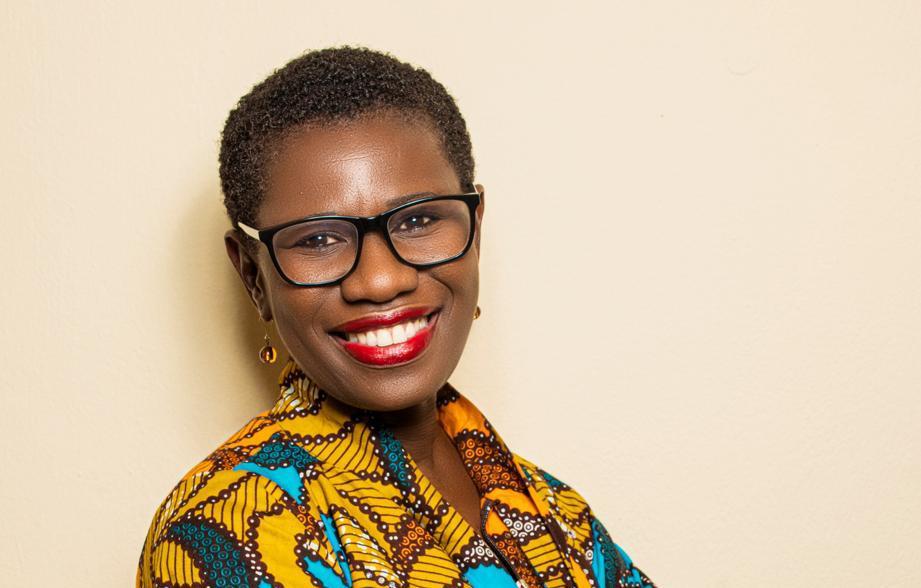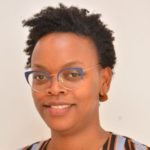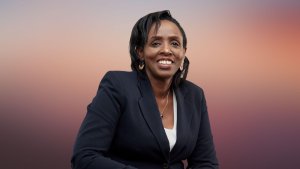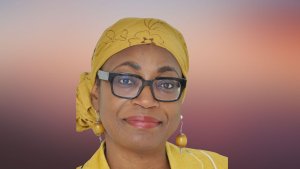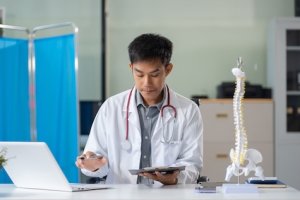“We’re building a data system, because you can’t really manage a city if you don’t know who’s there and what’s in it.”
In this interview, Camilla Toulmin and Folashade Soulé speak with Mayor Yvonne Aki-Sawyerr, OBE, Mayor of Freetown, Sierra Leone.
Yvonne Aki-Sawyerr OBE was sworn-in as Mayor of Freetown in May 2018 with a commitment to transform Freetown using an inclusive, data-driven approach to address challenges in the city. The 3-year Transform Freetown plan details 19 concrete targets across 11 sectors and covers issues ranging from tackling environmental degradation to facilitating the creation of jobs in the tourism sector. A finance professional with over 25 years of private sector experience in strategic planning, risk management consulting and project management, Mayor Aki-Sawyerr’s public sector engagement began with her work during the 2014-2015 Ebola epidemic and her subsequent role in driving socio-economic recovery in Sierra Leone post Ebola. Mayor Aki-Sawyerr is a Chartered Accountant and holds an MSc in Politics of the World Economy from the London School of Economics and a BSc Hons in Economics from Fourah Bay College. She was recently recognized in the BBC 2020 100 Women list.
We’ve been hearing from people in different parts of Africa about managing the COVID crisis and post-pandemic recovery, at national and international level. But we were really keen to get a perspective from sub-national level. How has the city organised to fight against COVID-19? What are some of the initiatives which you have been able to take at city-level? Knowing how deeply involved you were with the Ebola crisis, what are some of the differences, contrasts, and lessons you learned from the Ebola crisis of relevance for COVID-19?
Mayor Aki-Sawyerr: The Ebola experience taught me the importance of acting fast. It’s essential to have a clear plan, and to get people around this strategy, so they have a sense of direction. We called the first city-level emergency COVID-19 meeting in mid-February 2020. This was a good 6 weeks before the first cases were confirmed in Sierra Leone. We brought a wide range of partners together, NGOs, people who’d worked with me on Ebola, and also outside experts, such as a scientist, who does a lot of thinking around epidemiology. By the 16th March we had put together a plan, which reflected the context of Freetown and the experience of Ebola. The plan had three key elements responding to the fact that this is a city where 35% of our populace live in informal settlements which are densely crowded with very little space for social distancing. The significance of informal settlements has been a key narrative in terms of response measures. Another very important feature is the fact that 47% of the population do not have access to running water. Given the other most significant element of protection is hand-washing, our plan needed to reflect these particularities. But we also had learned during the Ebola outbreak the importance of community ownership. People must understand what’s going on, and in order to understand they must not only hear it, but also internalise it. To do this you need trusted sources of information, and a trusted approach. During the Ebola outbreak, a WHO doctor with experience of previous Ebola outbreaks in Africa, said “Yvonne, you’ve got to talk to the people under the mango tree” so we built that into the plan.
Freetown City Council’s preparedness and response plan for COVID-19 therefore has three elements – behaviour change messaging, behaviour change support, and isolation and quarantine support. You can find a copy of our plan on the FCC website. The three elements do exactly what their names suggest. The first question is how to get the message across, so we chose to work with a horizontal approach and a vertical approach. Horizontal meant targeting the entire city at ward level. We have 48 wards in the city, so we worked to have this message get out everywhere. For about 5 months, starting in May, we had 480 people going door to door. We also worked vertically through trusted organisations, such as the market women’s association, the drivers’ union, inter-religious council, and Ebola survivors’ group, all of whom are basically influencers at the level of a shared experience, a shared objective, a shared profession. They were in addition to the people turning up at your door, and in market-places. You need the right kind of messaging - not just talking at people, but talking with people. We held focus groups on Saturdays at community centres, to create further opportunities for conversations. On the social media level, I ran a six week session called “Let wi tok bot Corona” on Facebook Live 3 times a week on Mondays, Wednesdays and Fridays from 9.15 till 9.30. That was in the early stages, starting in April or May, the idea being to provide a platform for people to talk at a wider level. Not just in community meetings, but Facebook Live, and we also aired on radio too. Thousands of listeners and viewers tuned in each time, including people in the diaspora. So we tried many different forms of messaging, like videos, TV advertisements, and latterly an animation called Bola and Rona, which are short for Ebola and Corona. They are two cartoon figures who discuss together about what he used to do and what she’s got to watch out for, if she wants to get these people. That’s airing on TV now. They’re short, just 2 minutes, to keep giving the core messages of masking up, and avoiding crowds. Do look at the plan on our website if you want more details.
But what about people in slum settlements where you can’t socially distance and you don’t have a water supply? How do they manage?
The reason I was late just now is we are just literally finishing up our two-year report on “Transform Freetown”, which has a COVID section and which goes to print tomorrow. Let me summarise, though you’ll see that everything I am saying is there. Behaviour Change support works on what can you do if you don’t have running water and cannot socially distance. We had the “Mask-Up Freetown” campaign through which we gave out 145,000 masks free to the vulnerable, particularly women in markets – market traders, commercial drivers and persons with disabilities. We worked with three local designers on our “Mask-Up” campaign, which also provided much-needed employment for local tailors. Much of this COVID work we did with funding from the EU, and the UK government’s FCDO, but we had other smaller contributions too, from philanthropists, private sector organisations and Freetonians.
For water, we delivered more than 160 rainwater harvesting systems, into informal settlements so they could get water, as it was the rainy season by then. Now it’s the dry season, we’re looking at trucking of water supplies, arranging this with the water management committees for each of the settlements. More than 160 rainwater harvesting systems went out, each with 5,000 or 10,000 litre tanks, providing a considerable increase in water provision. We also provided handwashing stations in markets, supported by monitors in 23 of our markets. These people are still stationed there fulltime during trading hours, with a megaphone, to remind people that COVID hasn’t gone away, so mask-up and wash hands. Another area of support is on food. When this all started, the news internationally and what we saw from other countries in the media made us think that the national government might put the city into lock-down. What would the consequence be for people who live hand to mouth and day by day? There were in fact three days of lockdown in April last year. We gave food out in three communities targeting the elderly. On a more sustainable level, we are now supporting 300 women-headed households in an urban farming pilot project. We’ve given them tools, seeds, and planting boxes, in three informal settlements. I’ve been looking at the photos of the scheme and I should be going out next week to see how they’re getting on. What started as a COVID response we will now carry on with post-COVID. The idea was to see if we could provide some basics – clearly we’re not growing rice - but vegetables, such as peppers, and tomatoes - if there’s a lock-down vulnerable residents have a better chance of coping with it if they are growing some of their own food. For women who are the family’s breadwinner and have several children as dependents this can make a world of difference. We’re really excited with this urban farming scheme and want to scale up and continue with this as a sustainability intervention.
Often what happens when there is a health crisis is that people become afraid of hospitals. I saw this with Ebola. In particular, pregnant women don’t want to go to the main hospital, but if you’re going to have a baby, you’re going to have a baby. So we set up to upgrade six Primary Health Units (PHUs) where you can actually deliver babies. Two of these have now kicked-off, thanks to support from the EU, and the World Bank has agreed to fund another three. And then on isolation and quarantine. How do you support and break the chain of transmission when you’re in an informal settlement? We raised money for a 180-bed facility for a Community Care Centre, using the army training facility as the site, making some modifications and supplying equipment. The Ministry of Defence provided the staffing and funding came from the EU and FCDO. The rationale is if you have people who are asymptomatic, you don’t want them in the community. They can’t safely isolate in an informal settlement so the virus will continue to spread. You don’t want to take them to the few treatment centres available and they will clog them up. So why not develop a really decent place for people to go for quarantine purposes. We’ve had low levels of positive tests. Pre-Christmas, we didn’t get to the point when we needed to use the CCC, since we were at only about 3 cases a day, so the centre was mothballed. Now after the holidays, and with the new variant, we’ve seen up to 140 cases a day. There has been a really big jump. At the moment the centre is mothballed while we wait to see what happens. You do afterwards wonder whether you’ve made the right decision, but things need to move fast at times like this. Perhaps the most important thing we’ve done for quarantine has been supporting people who are having to isolate in their homes. The government makes a decision that a home must be quarantined, but there’s no guarantee people will get food on time. We’ve stepped in, providing food for 1,700 quarantined persons in 264 homes and this has made a huge difference for those concerned. We’ve received so many messages and texts. I remember one message that read “thank you so much, that made a big difference, until the City Council delivered supplies, my baby had no baby food”. So, in a nutshell, that’s what we’ve been doing.
It’s an impressive and comprehensive approach, which offers many good examples for other cities to follow in Sierra Leone, and other parts of the world. Are you working to spread this experience?
Yes, indeed. I have been working with the C40 Cities, Mayors’ Migration Council, Bloomberg Harvard City Leadership Initiative, the Global Parliament of Mayors and United Cities and Local Government (UCLG). These are the five main platforms for city partnerships that we’re involved in. We’ve shared our experience and our plan is on our website. I was also part of the C40 Cities Mayors’ Taskforce for developing plans for a just and green recovery, which builds on sharing experience with what we’re doing and how we’ve managed the pandemic to date.
Let me ask about Transform Freetown. I saw that you have been instituting a property register and starting to get a proper system of ratings which would allow the city an independent source of revenue. How’s it getting on?
I have to say, it was in my manifesto to digitise the entire city. We did it! The whole thing! There’s an article in the Economist and in African Arguments about this. In short, we used satellite images to identify every roof top in the city, and we measured them, we sent enumerators out, from which we developed an electronic tax system. We have moved from having registered 30,000 to more than 100,000 properties. I can show you if you let me share my screen. This programme has every property in the city captured, which has allowed us to increase the property rates revenue five-fold. But we’ve faced big challenges with central government. So much so that the Ministry of Local Government put a stop to the implementation of the new system. We are not allowed to collect property rates. But I do expect to be able collect taxes later this year. We’ve built a great system and we’re looking forward to using this. The new system was funded by FCDO. We’ve had support from the International Centre for Tax and Development, from the International Growth Centre, and multiple local players here.
This then gives you a knowable, established basis for raising municipal revenue?
Yes, certainly it gives you a knowable financial base. But you can’t really manage a city if you don’t know who’s in it and what’s in it. We are building a broader data system to which we can add as we go, so everything we do in council is rooted in one common comprehensive software system. We have property rates, and we hope to have building permits devolved to the City. It needs to include assets which we own, so that the administration of the City Council needs to refer and speak to one single system, which is currently not the case.
There have been two lock-downs, of three days each time. We currently have a 10pm to 5am curfew. But this scientist I mentioned earlier wrote a really good article the other day saying some of these measures are totally counter-productive in African cities, where there is a high degree of informality and people spend more time outdoors. Creating a curfew is taking people indoors when they wouldn’t normally be indoors. Living accommodation is so tight and unsanitary for many people, which creates a counter-productive situation. Then you get this mad rush before curfew. Public transport is made up of mini-buses which are jam-packed as everybody is trying to get home before the curfew starts. That’s the way to create more super-spreaders. I am not convinced that the curfews and lockdowns serve the purpose here which they evidently do in other parts of the world. We need to be more consistent with mask-wearing indoors and more consistent with testing and tracing. As we see to some extent in the UK, and amongst the Trumpists in the US, the “No mask- wearing brigade”, it’s all a question of trust and believing the message. Imposing curfews and lockdown has had a positive aspect which is they have restricted movement between districts and increased testing, so if you leave Freetown at the moment you have to be tested first. This increase in testing has shown an increase in cases, which helps us all get a better sense of reality. Previously, we had three cases a day pre-Christmas, and we have to ask ourselves was that really true or was there just not enough testing?
What’s the prospect of a vaccination roll-out by Freetown City Council?
These are responsibilities held by national government, so we do not have the mandate to take action on these issues, and I am not aware of central government’s plans.
And can you pursue your green recovery options by getting investment into renewable energy? Is this something for city government?
Sadly not. On energy planning and investment, this also is a central government responsibility. The Local Government Act which dates from 2004 is silent on off-grid energy systems, since we were not then thinking about off-grid solutions. What we can do is to plant trees, and we plan to plant one million trees as we laid out in “Freetown the Treetown”. It’s really important to us to protect those trees. But in Freetown as a whole, more than 80% of cooking fuel comes from firewood, so we are making alternative fuels for clean cooking our focus.
Its tough enough trying to do the things for which we have a mandate. We’ve got our hands full! We try to make sure anything we build has solar panels. I can’t take on additional things for which the City Council does not have a mandate and where we would really struggle to get things done. But we know that the only way forward is a green way forward. So we must strengthen climate resilience, by planting a million trees. We are also advocating for building permits to be devolved effectively and issued by us, so we can take environmental management into account in development control. This would help a lot in preventing construction in flood prone areas. Since we started the flood mitigation programme, we have not had any serious flooding.
